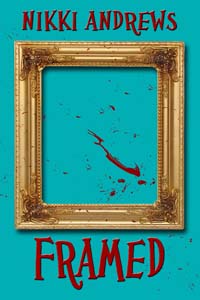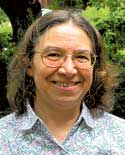 I want to thank author, Nikki Andrews for coming on the blog. I’ve gotten to know Nikki as the editor of my latest novel, but there’s so much more. She has worked as a picture framer (which came in handy for her new novel, Framed), craft store clerk, and administrative assistant, but in her real life she is a writer, editor, and songmaker. She is a member of Talespinners and the New Hampshire Writers Project, and has published two science fiction novels and several short stories. When she’s not at her desk, she might be releasing salmon fry on the Piscataquog River, making jams or sweaters, or exploring her surroundings on foot, bike or snowshoe. She lives near a waterfall in New Hampshire with her husband– who she describes as ‘wonderful’ –a possessive cat, and assorted wildlife.
I want to thank author, Nikki Andrews for coming on the blog. I’ve gotten to know Nikki as the editor of my latest novel, but there’s so much more. She has worked as a picture framer (which came in handy for her new novel, Framed), craft store clerk, and administrative assistant, but in her real life she is a writer, editor, and songmaker. She is a member of Talespinners and the New Hampshire Writers Project, and has published two science fiction novels and several short stories. When she’s not at her desk, she might be releasing salmon fry on the Piscataquog River, making jams or sweaters, or exploring her surroundings on foot, bike or snowshoe. She lives near a waterfall in New Hampshire with her husband– who she describes as ‘wonderful’ –a possessive cat, and assorted wildlife.
I’m always curious about what jazzes creative artists. Where do you find the inspiration for your writing?
Let’s think about that. The first thing I remember creating was a song about ladybugs when I was five. I’ve written about ponies and proselytizing, gravel pits and time ships, floods and foxes. Inspiration is everywhere. It can arise from something I’ve experienced, noticed, or wished for. A scrap of dialogue or an intriguing phrase sometimes sets me off, or a dream. Deep down, I think inspiration is a desire to create a world we can control, even if only for a short time. Writing is one way to share our inner reality with others.
Your first two books were sci-fi and your latest is a mystery. What drew you to the mystery genre? Should we expect more mysteries in the future?
Solving puzzles has always appealed to me, and in writing mysteries I get to solve two puzzles–the mystery itself and the challenge of writing the clues. I usually end up rewriting backwards to make sure I have enough red herrings and have hidden the real clues well enough. I’m nearly ready to submit a sequel to Fra
med, and I have plans for several others in that series. I also have a stand-alone mystery that may see the light of day if I ever get around to deleting the libelous scenes. (I wrote it in a fit of fury about a real-life situation.)
What do you find to be the most challenging thing about being a writer? And how do you cope with that challenge?

Whether it’s because of laziness, lack of self-confidence, or the feeling that writing is an indulgence I need to earn, sitting down and getting started is the
biggest challenge I’ve found in my writing life. And the solution is to apply the bum gum and get in the chair. I find it very helpful to have deadlines and encouragement on a regular basis from other writers, including real-life meetings with a writing group as well as online support.
Now, the most challenging thing about being an author is promo. I enjoy face to face interactions with readers, but I’m a bit of a technophobe with a very low tolerance for frustration. Mule, my computer, gets defenestrated at regular intervals.
You mention that you’re an author, songwriter and editor on your webpage. Any similarities in how you approach a song to how youapproach a novel?
Oh, what an interesting question! Both songs and novels seek to evoke emotion and tell a story, but at a different pace and with different tools. In both, rhythm and word choice are critical. Song has the advantage of melody and beat, which touch our emotions in a more visceral way than mere words. Novels, on the other hand, have space to stretch out. A song can stick in your head; a novel can take you to a new world. The approach to both is similar in that there is always that I-gotta-this-down moment when I drop everything and run for a pen. The joy is in the frenzy of creativity, the satisfaction in the tinkering to perfection.
What are you reading? Any favorites?
As I write this, I have three books in progress. I’m rediscovering the original Cosmos by Carl Sagan. How I love his passion and clarity! Nancy Means Wright’s Walking Into The Wild is a delightful, colonial YA adventure in my neighboring state of Vermont. The third is Tracking and the Art of Seeing by Paul Rezendes, an ongoing study of how to follow wild animals that has surprising implications for writing. In my pile are books by Ute Carbone, Susan Coryell, your own Dirty Water, and Jessie Salisbury’s Orchard Hill. I have too many favorites to mention.
What’s something you think your readers would enjoy knowing about you?
I once stood up in town hall and made train noises at the Planning Board. And I still haven’t gotten my Formula One Ferrari or driving lessons from Fernando Alonso.
Tell us about your new mystery novel, Framed.
Framed is a cozy mystery, in the tradition of amateur detectives whose vocational expertise gives them a unique insight into crime. It’s set in the beautiful Monadnock region of New Hampshire. Here’s the blurb:
When a long-lost painting turns up at Brush & Bevel, a decade-old mystery is reawakened. What really happened to artist Jerry Berger and his model Abby Bingham? Was it a murder-suicide, as the police proclaim, or was it something far more sinister?
Gallery owner Ginny Brent and her loyal staffers, Sue Bradley and Elsie Kimball, each take a different path to unravel the mystery. Together, their discoveries start to form a cohesive whole. But as they get closer to the solution, they discover to their horror that art is not the only thing that can be framed.
In Framed, which of your characters is your favorite? Why?
I love all my characters, of course, but the one that surprised me the most is Maculato, the frog-chasing bird dog. I think it’s because I never expected him to have such an engaging personality. He’s funny, clever, faithful and independent. I like dogs well enough, but I’ve never lived with one long enough to have deep insight into them. Mac just sort of invented himself.
You mention on your website that you’ve earned a living as a picture framer. In what ways did that experience inform Framed which revolves around several characters in a framing business/gallery?
Framed is based on my nine years as a picture framer, the best job of my life until I became an editor/writer. While I never came across a murder during that time, I did meet wonderful characters, some of whom have cameos in the book, though no one is an exact copy of the real people. I wanted to share the camaraderie I had with my co-workers as well as the sense of community in a small town. I also wanted to show my respect for the manual labor that goes into all fine art. And, well, whenever you work with the public, there is always someone you wouldn’t mind bumping off!
Where can a reader pick up a copy of Framed?
It’s available now at Amazon.com and The Wild Rose Press (see links below). As of April 18, 2014, Framed is available in both ebook and print versions from all the usual online vendors (Amazon, B&N, Kobo, and many others) as well as The Wild Rose Press.
Thanks for sharing yourself with us today. Is there anything you’d like to add?
My two scifi books, Chicken Bones and A Windswept Star, are still available on Amazon, but I am in the process of combining them with a new third story, The Edge of Possibility, into a single volume that I hope will be available later this year. Thanks for hosting me, Richard. You asked some great questions and it was a pleasure answering them.
Contact info for author, Nikki Andrews:
I love to hear from readers:
Website: www.nikkiandrewsbooks.com
Twitter: @NAedits
Purchase Framed at:
Amazon: http://amzn.com/B00HJEHFV2
The Wild Rose Press: http://www.wildrosepublishing.com/maincatalog_v151/index.php?main_page=product_info&products_id=5515

Thanks for hosting me, Richard, and thanks for the great questions!
Standing in front of the town politicians making train noises sounds like a book idea to me. Enjoyed the interview and reading Framed.